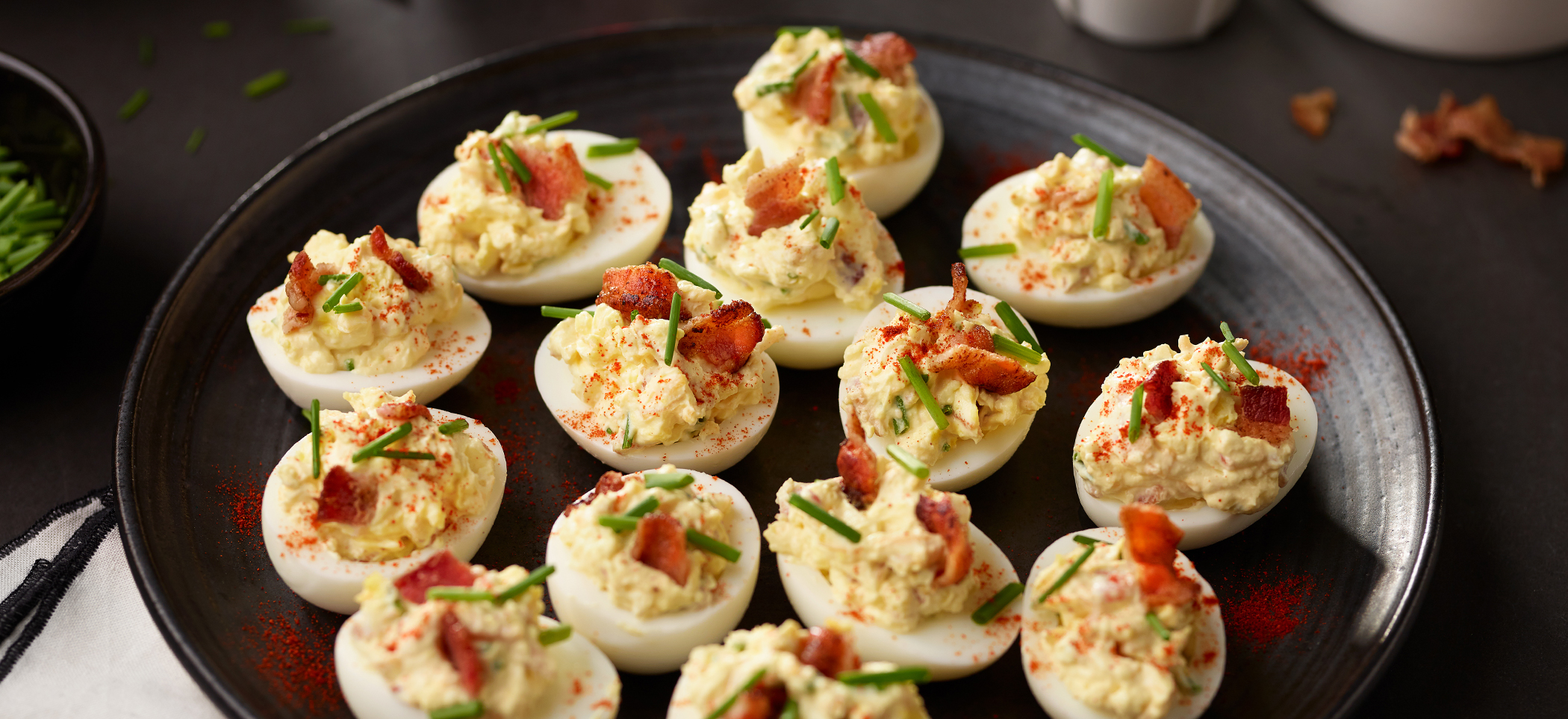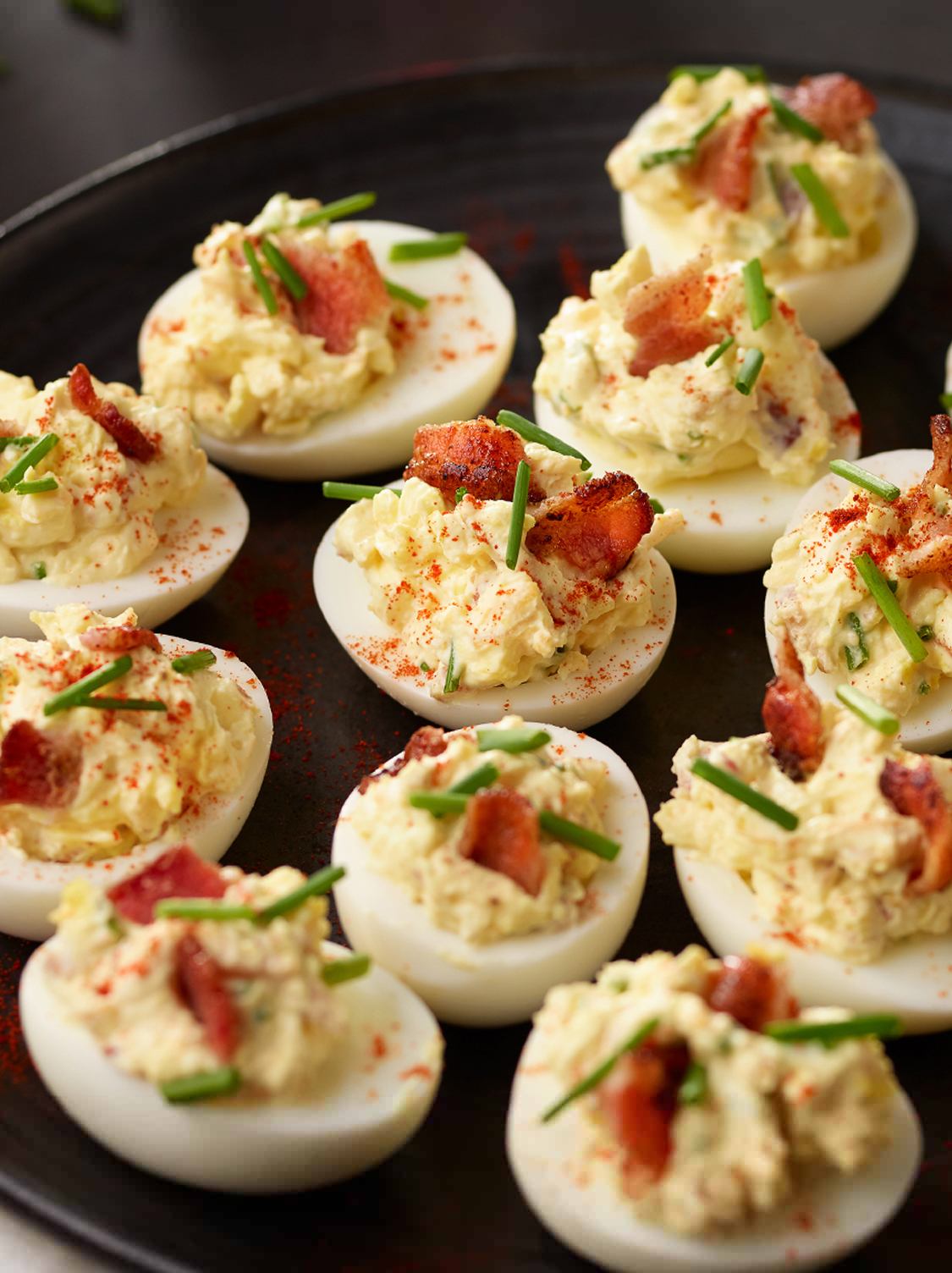

-
30M Total Time
-
30M Prep Time
-
8 Ingredients
-
24 Servings
Directions
CUT eggs lengthwise in half. REMOVE yolks to medium bowl. RESERVE 24 white halves. Finely CHOP remaining four white halves and SET aside.
MASH yolks with fork. ADD mayonnaise, sour cream, mustard, lemon juice and pepper; MIX well. ADD chopped egg whites, bacon, cheese and chives; MIX well.
SPOON 1 Tbsp. yolk mixture into each reserved egg white half. REFRIGERATE, covered, to blend flavors. SPRINKLE with paprika just before serving if desired.
Ingredients
- 14 large hard-boiled EGGS
- 1/2 cup mayonnaise
- 1/2 cup sour cream
- 1 1/2 tsp. Dijon mustard
- 1 tsp. fresh lemon juice
- 1/3 cup crumbled cooked bacon
- 1/4 cup finely shredded sharp cheddar cheese (1 oz.)
- 2 Tbsp. chopped fresh chives
Tips
No-mess method: Combine filling ingredients in a 1-quart plastic food-storage bag, press out air and seal bag. Press and roll bag with hand until mixture is well blended. Push filling toward one bottom corner of bag. Snip off about 1/2 inch of corner. Squeeze filling from bag into egg whites.
Make ahead: Deviled Eggs can be made up to 12 hours ahead. Keep covered and refrigerated.
Hard-boiled eggs are easiest to peel right after cooling. Cooling causes the egg to contract slightly in the shell.
To peel a hard-boiled egg: Gently tap egg on countertop until shell is finely crackled all over. Roll egg between hands to loosen shell. Start peeling at large end, holding egg under cold running water to help ease the shell off.
Hard-boiled egg storage time: Hard-boiled eggs in the shell can be refrigerated safely up to one week. Refrigerate in their original carton to prevent odor absorption. Once peeled, eggs should be consumed within two days.
Portable tip: Prepare filling in plastic bag, as above. Carry whites and yolk mixture separately in plastic food-storage bag. Fill eggs on the spot, pressing filling out of snipped corner of bag.
This recipe is a good source of choline.
Per serving: 1/24 of recipe
- Calories 94
- Total fat 8 g
- Saturated fat 2 g
- Polyunsaturated fat 3 g
- Monounsaturated fat 2 g
- Cholesterol 117 mg
- Sodium 110 mg
- Carbohydrates 1 g
- Fiber 0 g
- Sugar 0 g
- Protein 5 g
- Vitamin A 54 mcg
- Vitamin D 1 mcg
- Folate 15 mcg
- Choline 88 mg
- Calcium 30 mg
- Iron 1 mg
- Potassium 48 mg
To ensure food safety, eggs should be cooked until both the yolk and the white are firm. Consuming raw or undercooked eggs may increase your risk of foodborne illness, especially for those with certain medical conditions. For recipes that call for eggs that are raw or undercooked when the dish is served, use either pasteurized shell eggs that have been treated to destroy Salmonella, or use pasteurized egg products.




